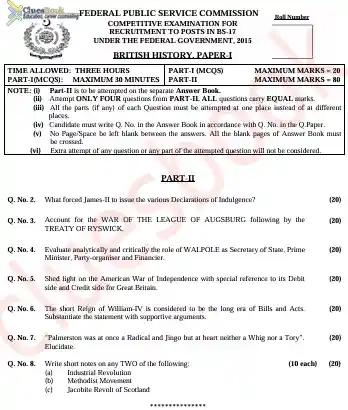CSS Past Papers
Download British History Past Papers CSS 2015 PDF explained with paper outline, recurring ideas, examiner’s insights, practice topics, study tips, and resources. A complete guide for CSS preparation.

The 2015 CSS British History paper tested candidates on constitutional growth, social transformation, and political change. It required strong evidence-based writing instead of simple story-telling. Reviewing this paper helps CSS aspirants understand how to approach history with analysis and argumentation.
Major Domains Reflected in the Paper
- Growth of monarchy and constitutional development
- Religious conflicts and settlements in early modern Britain
- Industrial progress and resulting challenges
- Nineteenth century reform movements
- Britain’s global role during wars and empire
- Modern politics from Attlee to Thatcher
About the CSS
The CSS (Central Superior Services) Competitive Examination is a rigorous federal-level test administered by the Federal Public Service Commission (FPSC) to select candidates for prestigious civil service roles across Pakistan. The exam’s rules and regulations, covering age limits, eligibility, subjects, and quotas, are detailed in the official CSS Rules section on the FPSC’s website.
The CSS Exam Rules, issued by FPSC Pakistan, outline eligibility criteria, age limits (21–30 years), and a maximum of three attempts for candidates. The exam includes written tests, a medical exam, a psychological assessment, and an interview. Rules also define quotas, disqualification grounds, and subject selection for a fair recruitment process.
Paper Format CSS 2015
| Portion | Description | Marks | Time |
| Objective | Multiple choice questions | 20 | 30 minutes |
| Subjective | Four detailed essays out of six | 80 | 2.5 hours |
| Total | — | 100 | 3 hours |
Note for Candidates: Effective time division and presentation skills were essential to maximize scores.
British History Past Papers CSS 2015-What the Examiner Looked For
- Well-structured arguments with a clear thesis
- Integration of both political and socio-economic aspects
- Use of exact evidence: dates, acts, personalities
- Comparative evaluation of change across centuries
Study Areas Highlighted by 2015 Paper
Constitutional and Religious Issues
- Norman reforms and impact on governance
- Tudor religious changes under Henry VIII and Elizabeth I
- Civil War and constitutional legacy
Industrial and Political Reforms
- Causes and effects of the Industrial Revolution
- Reform Acts of 1832, 1867, 1884
- Irish nationalism and Home Rule
Modern British Politics
- Role of Britain in World Wars
- Attlee’s welfare state foundations
- Economic restructuring under Thatcher
Common Errors by Candidates
- Writing lengthy narratives without analysis
- Weak factual foundation with no dates or laws
- Ignoring social history in favor of only political aspects
- Lack of balance in concluding arguments
Illustrative Topics for Practice
- Analyse the long-term results of the Glorious Revolution.
- How did the Industrial Revolution reshape society and economy.
- Evaluate the democratic value of the 19th century Reform Acts.
- Discuss Britain’s political condition after World War II.
- Explain the economic vision of Thatcher and its effects.
Resources for Study
- Main Books: Trevelyan’s History of the English People, Oxford History of Britain
- Focused Works: Texts on Industrial Revolution, Irish Question, Attlee reforms, Thatcher era
- Primary Sources: Beveridge Report, Reform debates, Magna Carta extracts
- Practice Collection: CSS past papers from previous years
Guidance for Preparation
- Map 2015 questions with today’s FPSC syllabus themes
- Read survey texts for broad coverage and specialized works for modern history
- Practice essays with a 35–40 minute time limit
- Use charts, timelines, and maps for clarity
- Review a series of past papers (2010–2023) to trace examiner’s patterns
Download British History CSS Past Papers 2015
You can download the original CSS 2015 British History Paper PDF from the link below. It is unsolved and arranged for practice.
Example Framework
Impact of World War II on Britain
Thesis: World War II transformed Britain’s domestic policies, leading to welfare state creation.
Evidence: Rationing, Beveridge Report 1942, NHS Act 1946, Labour’s economic planning.
Counter: Fiscal crisis and reduced imperial power.
Conclusion: Despite economic strain, WWII paved the way for social reforms that shaped modern Britain.
The CSS 2015 British History paper required candidates to show analytical strength and a balanced approach. Successful answers combined arguments, supporting evidence, and critical conclusions.
Practicing this paper helps students develop exam-ready strategies for scoring high marks.

